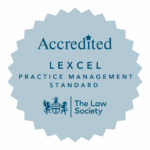In this episode, Janet Lane, one of our expert litigation solicitors, delves into the complex and often sensitive topic of contesting a will. She’ll be answering key questions such as what makes a will legally valid? Who has the right to challenge one? And what are the most common reasons for disputes from fraud to undue influence? Janet will also guide you through the legal process of contesting a will, helping you understand your rights and the steps involved. Stay tuned for expert insights into this important area of law.
Full Transcript
Welcome to Legal Clarity, a podcast brought to you by Hatch Brenner Solicitors. Discover a blend of legal expertise, case studies and real life journeys designed to inform and inspire. In this episode, Janet Lane, one of our expert litigation solicitors, delves into the complex and often sensitive topic of contesting a will. She’ll be answering key questions such as what makes a will legally valid? Who has the right to challenge one? And what are the most common reasons for disputes from fraud to undue influence? Janet will also guide you through the legal process of contesting a will, helping you understand your rights and the steps involved. Stay tuned for expert insights into this important area of law.
So, Janet, can you contest a will?
Janet: Yes. The simple answer is that yes, you are entitled to contest a will. But the first place to start is what makes a will Valid. And so I think when you determine whether a will is valid or not, then you’re looking to the Wills Act 1837, which says that a will must be in writing signed by the testator or some other person in their presence and at their direction. It must appear to the that the intestine intended to give effect to the will by making their signature on it, and the testator’s signature must be acknowledged by them in the presence of two or more witnesses who were present at the same time, and each witness must attest and sign the will or acknowledge the testator’s signature in the presence of the testator. So that’s the first place to start. So then once we’ve looked at that, whether the will is valid, then we can move on to can you contestable. So if the will doesn’t comply with the requirements of the will act it’s invalid anyway. So then we’re moving on to who can contest a will. So only certain categories of Categories that people can contest a will. These are anybody named as a beneficiary in the will. Anyone named as a beneficiary in a previous will. Family members with a natural claim to the estate of the deceased, and whether or not they are named in the will i.e. a spouse, a civil partner, children, stepchildren, adopted children and finally, anyone with a financial interest in the estate such as creditors of the deceased.
And what are the common reasons for someone to dispute a will?
Janet: Well, there’s different reasons why people want to challenge a will. One of them is challenging the validity of the will itself. So the document itself and whether the documents being executed properly and have already been through the formalities that have to be followed. And there’s whether there’s a lack of testamentary capacity, which is such that the deceased didn’t understand the nature of the will or its consequences. So they put a name to a document when not actually Understanding what it’s about. And this is established basically by determining their state of mind when making the will. And we have to take into account testamentary freedom so people can make eccentric or foolish decisions. But that’s not enough to establish any incapacity or insanity. And so we need to look generally at their will making pattern and their whole life sometimes. And then there is whether the testator understood the extent of the property that they, they’re disposing of, and whether they understood and appreciated any claims that could be brought against the estate. And finally, whether their mind was affected by any disorder or delusion of the mind. And that was active at the time of bringing about the, the will.
Janet: And so these these are all things that you really need to take into consideration. Another matter where it could be invalid is undue influence. I think most people have heard of these and where a will has been made under pressure or coercion. This is a hard hurdle to get over if you’re trying to say that will is invalid, because generally that’s something that’s not seen, it’s not evident and it’s more subtle. And the court won’t assume that there’s undue influence just because the relationship between the deceased and the person who is exerting the influence. And finally, there’s fraud, what we call fraudulent colony, which essentially is fraud in wills. And it’s a distinct ground of being able to challenge a will. And this is more where it’s involved, the poisoning of the mind. So somebody acted in a way to make the testator think in a certain way and leave their estate in a, in a certain way. And which will benefit them. So it’s by making dishonest representations to the testator. So there has to be some element of dishonesty there.
And what is the process of challenging a will.
Janet: We shouldn’t resort to the court straight away. That’s the first thing that I would say is that if somebody wants to challenge a will, then this needs to be done. Usually first is by just informal correspondence or even if they come to to solicitors, then we will write a first letter to the executors or the trustees. And it’s, it’s essential to try and to set out what your concerns are and to obtain information. Sometimes this is done by way of a formal letter that we call a lark and Ucas request, which is asking for details of the the will and how the will was made, who were the witnesses, etc. and this will normally be we’re writing to the solicitors who drafted the will. We’re essentially just asking for information about the will itself first. And if you are, if there’s anything specific about they will or there’s any concern about capacity, then also this needs to be dealt with informally to start with. And essentially it will go from there. So if you receive sufficient information to be able to decide that either the will is fine and it was valid and there is no challenge or you still want to proceed, then that’s when we start looking at formal letters. And then what most people would expect is going to the court.
Thank you for listening to Legal Clarity, a podcast brought to you by Hatch Brenner Solicitors. For more information, make sure to check out our website.




